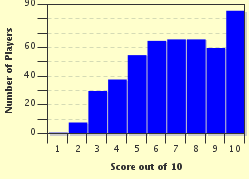Quiz Answer Key and Fun Facts
1. The etymology of the word 'agnostic' is from which language?
2. Which English scientist, and strong supporter of Darwin, came up with the name of agnosticism in the nineteenth century to explain his beliefs?
3. Which American political leader was nicknamed 'The Great Agnostic'?
4. The collection of hymns and religious writings called the Rigveda (or Rig Veda) acknowledges agnosticism. With which religion is this work associated?
5. The Roman Catholic church acknowledges the validity of agnosticism to some degree.
6. The actor W. C. Fields was well known as a non-believer, although he did read the Bible during his final days. What reason did he give?
7. 'Why I am not a Christian' was written in 1927 by which British philosopher?
8. The idea of agnosticism was part of Ancient Greek philosophy.
9. The eighteenth century philosopher and agnostic David Hume was born in which country of the British Isles?
10. Which author of the 'His Dark Materials' books described himself as both atheist and agnostic?
Source: Author
rossian
This quiz was reviewed by FunTrivia editor
CellarDoor before going online.
Any errors found in FunTrivia content are routinely corrected through our feedback system.

